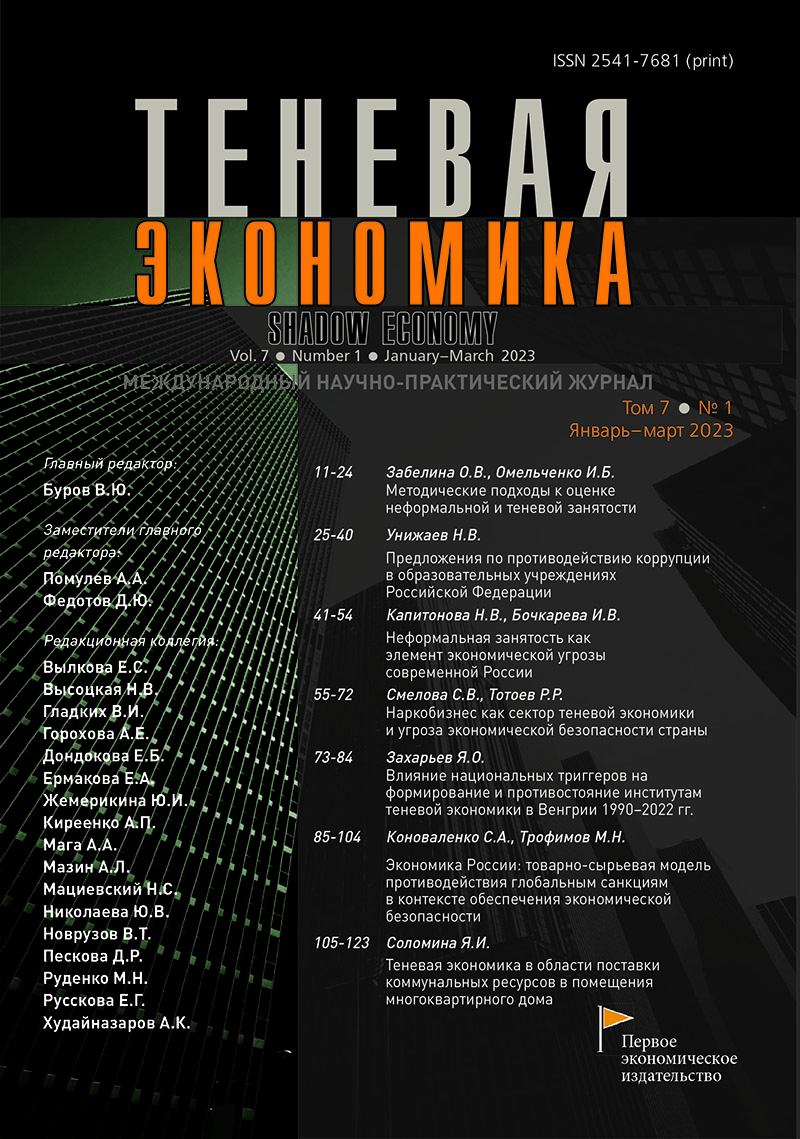The influence of national triggers on the formation and opposition to shadow economy institutions in Hungary in 1990-2022
- Authors: Zakharyev Y.O.1
-
Affiliations:
- MGIMO University
- Issue: Vol 7, No 1 (2023)
- Pages: 73-84
- Section: Articles
- URL: https://journals.eco-vector.com/2541-7681/article/view/606661
- DOI: https://doi.org/10.18334/tek.7.1.117085
- ID: 606661
Cite item
Abstract
The specifics of the economic course of the Hungarian government in the 1990s and early 2020s, taking into account the disapproval of a number of vectors of the policy of the European Union, are analyzed. The analysis of the specifics of shadow economy institutions in the state under the influence of the USA and the EU is given. For the first time, the role of national triggers is shown. National triggers are considered as the basis of the behavior of the society titular majority. They are also a basis for economic development and can be considered as the form of an object of manipulation by foreign countries in order to achieve actual political results. The errors of the collective West\'s cessation of national triggers in the case of Budapest within the framework of Hungary\'s membership in the EU and NATO have been pointed out. The author explains why the country is pursuing an independent policy, and Brussels and Washington have so few resources to put pressure on Budapest in the context of promoting the shadow economy and their interests in this vector of Eastern Europe.
Keywords
Hungary, European Union, Hungary's shadow economy, European Union shadow economy, national triggers, national triggers and economy, Hungary's shadow economy experience, EU and US pressure instruments, fighting the shadow economy in Hungary, international economic relations in Eastern Europe, Budapest, Hungary's open economy
References
- Гумилёв Л.Н. Этногенез и биосфера Земли. - СПб.: Кристалл, 2001. – 12-170 c.
- Гумилёв Л.Н. Тысячелетие вокруг Каспия. - М.: Айрис-Пресс: Рольф, 2002. – 20-200 c.
- Троцкий Л.Д. Перманентная революция. Marxists.org. [Электронный ресурс]. URL: https://www.marxists.org/russkij/trotsky/works/trotl004.html (дата обращения: 27.12.2022).
- Волкогонов Д.А. Перманентная революция. Троцкий. Политический портрет. / Т.2. - М.: АСТ, 1998. – 416 c.
- Cser F., Bogsányi D., Fodor A. 50th anniversary of the 1956 Hungarian freedom fight: questions and Answers. - Melbourne: Committee for the Commemoration, 2006. – 3-22 p.
- Puddington Arch Broadcasting Freedom: The Cold War Triumph of Radio Free Europe and Radio Liberty. - Lexington: The University Press of Kentucky, 2003. – 408 p.
- Blanton. T., Byrne Malcolm eds. «CIA had one officer in Hungary 1956: «No Inside Information» and «Little Outside Information»», National Security Archive Electronic Briefing Book No. 206, George Washington University National Security Archive. - 2006
- Weiner Tim Legacy of Ashes. - USA: Doubleday, 2007. – 6-100 p.
- Dujmovic N. Review of Legacy of Ashes: The History of CIA. Studies in Intelligence, Central Intelligence Agency. [Электронный ресурс]. URL: https://www.economicsvoodoo.com/wp-content/uploads/2007-09-10-CIA-Review-of-Legacy-of-Ashes-The-History-of-CIA_Central-Intelligence-Agency.pdf.
- Sciolino Elaine C.I.A. Defector to Soviets Is Permanently Expelled From Hungary. New York Times. [Электронный ресурс]. URL: https://www.nytimes.com/1989/12/01/world/cia-defector-to-soviets-is-permanently-expelled-from-hungary.html (дата обращения: 20.12.2022).
- Anthony H. Cordesman Arleigh A. Burke Chair in Strategy Trends in Real Hungarian Defense Spending: 1984-2001. Western Military Balance and Defense Efforts. A Comparative Summary of Military Expenditures; Manpower; Land, Air, Naval, and Nuclear Forces. Washington. - 2002. ̶ p. 113
- Матвеева Ю.В., Русина Ю.А. Человек советский: за и против. Homo soveticus: pro et contra. / Монография. - Екатеринбург: Издательство Уральского университета, 2021. – 412 c.
- Дрыночкин А.В. Экономика Венгрии. - М.: МГИМО-Университет, 2014. – 106 c.
- The Hungarian Example. Sigel. - 2005. - p. 180
- The Hungarian Example. Sigel. - 2005. - p. 179
- The Hungarian Example. Sigel. - 2005. - pp. 187–189
- Anikó Gregor, Fanni Dés The political economy of sex: lessons from the semi-peripheral Hungary since the 1990s. Central European University.Wien. [Электронный ресурс]. URL: https://events.ceu.edu/2021-05-10/political-economy-sex-lessons-semi-peripheral-hungary-1990s (дата обращения: 10.05.2021).
- Adam Fabry. The Political Economy of Hungary. From State Capitalism to Authoritarian Neoliberalism. - 2019. - p. 50-112
- Кушнир И. Экономика Венгрии. - М.: Иван Кушнир, 2021.
- Szabolcs J. Magyarody Hungary and the Hungarians. - USA: MATTHIAS CORVINUS PUBLISHERS, 2012. – 310 p.
- Cser F. Roots of the Hungarian Origin. Hungarianhistory.com. [Электронный ресурс]. URL: http://www.hungarianhistory.com/lib/cser/rootsls.pdf.
- Spain,France,Germany. Unctadstat.unctad.org. [Электронный ресурс]. URL: http://unctadstat.unctad.org/countryprofile/generalprofile/en-gb/724/index.html (дата обращения: 27.12.2022).
- Spain, France, Germany. Fao.org. [Электронный ресурс]. URL: https://www.fao.org/home/ru (дата обращения: 27.12.2022).
- Сагомонян А.А., Кремер И.С., Хазанов А.М. История международных отношений в XX — начале XXI века: СНГ и российско-украинские отношения. / Учебное пособие. - М.: Рема, 2009. – 254 c.
- Венгрия и Вторая Мировая Война: секретные дипломатические документы из истории кануна и периода войны. / Перевод с венг. - М.: Издательство иностранной литературы, 1962. – 367 c.
- Гречко А.А. и др. История второй мировой войны 1939—1945. / В 12 томах. Т. 9. - М.: Воениздат, 1978. – 423 c.
Supplementary files









